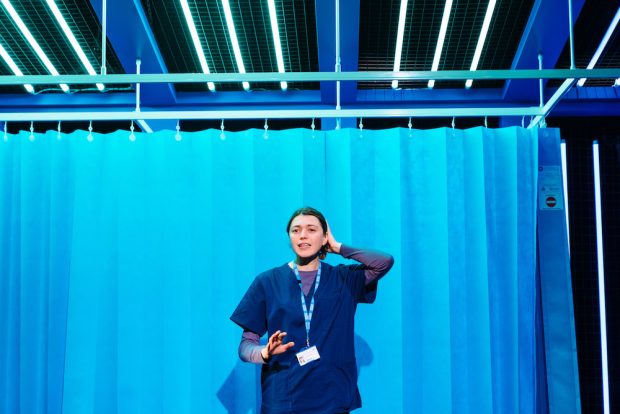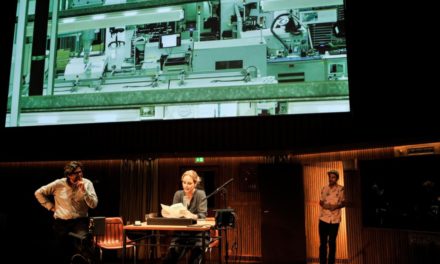Every day there is bad news about the NHS — junior doctors are exhausted, nurses need food banks and the stats are hitting all-time lows. So a new play about a junior doctor facing the stresses of the job is certainly timely. In fact, Nathan Ellis was inspired to write Super High Resolution, now given a powerful and moving production at the Soho Theatre, because his sister, Dr. Tamsin Ellis, almost quit her job. Yes, she was that desperate. And you can tell: the writing is personal and committed — this is a play that feels like it has been wrenched from the heart.
In this story, which is fictional but feels emotionally true, Anna is a 31-year-old A&E junior doctor whose nerves are frayed to breaking point from stress and lack of sleep. She’s clearly on the brink of burnout and we soon realize that the bad stuff that life throws at all of us will be enough to push her over the edge. Her professional life, with its long hours and relentless daily cases, also impacts her personal life. She has no time for any boyfriend and is a permanent disappointment to her sister Becca, a 35-year-old management consultant with a jogging-obsessive husband and 17-year-old stepdaughter, Sammy.
Despite constantly canceling any family gathering, Anna does have a strong bond with Becca, who is trying to get pregnant, and who’d like her sister to help Sammy get into medical school. In the background is the loss of the siblings’ mother, and a needy father who isn’t very well. The situation is turbo-charged when Anna meets David, a dishy 24-year-old whose seriously drunken brother-in-law has just accidentally whacked her on the nose. Ouch. The sparring match between Anna and David, who is immediately drawn to her, opens the play with an exchange of dialogue that is both smart and funny.
Then there’s an instant change of tone as Anna has to treat a suicidal older woman, who is in denial about her condition and determined to keep up suburban appearances. Here the conversation is beautifully written, with the patient’s evasiveness in deep contrast to Anna’s openness and empathy. Another side of her life appears when Meredith, a consultant, and Anna’s line manager, first bullies her into coming in for an extra shift and then reveals how her own life is under immense strain. To heighten the pressure we also see Anna giving two desperate monologues in which the strains of work appear as staccato snatches of conversation and exclamation which run through a typical day-long shift in less than a minute.
Anna is a good person and a good doctor. Meredith thinks she has the potential to become a consultant but warns her about keeping an emotional distance from her patients. But in Anna’s experience, the stress of the job means that she not only feels less and less for her patients but is also numbed in her personal life. When she connects with David she can barely express her feelings; Becca suggests that she should quit her job. Ellis implicitly argues that overworked doctors need people to care for them so that they can care for the rest of us. But also points out that there are limits to selfless care. And that the danger is not just the collapse of individual doctors, but also of the whole NHS.
The image of a broken health system pervades the play, as the exhaustion and numbness of Anna leaks into the story, which has a numbing feeling of inevitability about it. Although Ellis includes a great plot twist about David, most of the play is quite predictable but characterized firstly by the perceptiveness of the sibling rapport between Anna and Becca, and secondly by the sheer intensity of its vision of the NHS on the brink. As well as some very clever dialogue, there is also a climactic scene whose ferocity of despair is one of the most fearsome I’ve ever witnessed. It is unforgettable. Scorching stuff.
Although there have been a number of other plays about the NHS since the arrival of cost-cutting Tory governments — such as Nina Raine’s Tiger Country, Stella Feehily’s This May Hurt a Bit and Michael Wynne’s Who Cares — Ellis’s account is characterized by some superb writing. I was really struck by the shifts of tone between each scene, from the humorous banter of the opening to the quiet concern about Anna’s connection with her patient to the familiar spiky exchanges with her sister. Then there’s the fast-paced fractured monologues which convey the hectic shift of the typical doctor, and which carry on into any leisure time, making sleep impossible as the frazzled individual can’t shake off work—finally, the climatic scene — whose effect I’ve already described.
Director Blanche McIntyre and designer Andrew Edwards create a stage world of hospital curtains which, on the one hand, both convey the claustrophobia of A&E cubicles and enable quick transitions between scenes, and, on the other, rather restrict the movement of the actors. The intensity of the story is urgently conveyed through Jasmine Blackborow’s utterly convincing performance as Anna, who never leaves the stage for the 100-minute duration of the play. She charismatically creates a fully rounded portrait of an individual and is excellently supported by Leah Whitaker (Becca), Catherine Cusack (Meredith), and Hayley Carmichael (patient). LJ Johnson as Sammy and Lewis Shepherd, making his stage debut, as David adds intelligent charm to counterbalance the stress of the hospital scenes. The result is a profound piece of new writing.
This article was originally published by Aleks Sierz on November 11, 2022, and has been reposted with permission. To read the original article, click here.
This post was written by the author in their personal capacity.The opinions expressed in this article are the author’s own and do not reflect the view of The Theatre Times, their staff or collaborators.
This post was written by Aleks Sierz.
The views expressed here belong to the author and do not necessarily reflect our views and opinions.


















